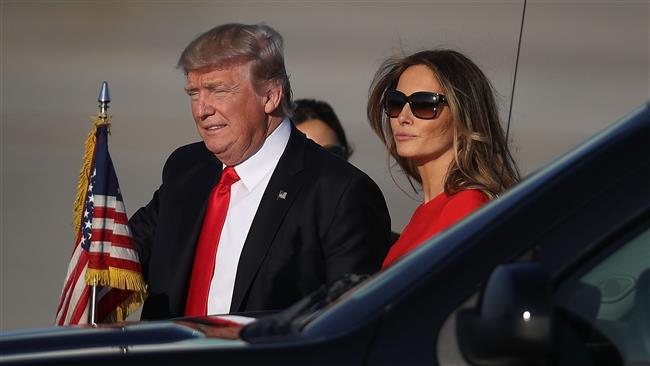Araweelo News Network

US President Donald Trump walks with his wife Melania Trump on the tarmac after he arrived on Air Force One at the Palm Beach International Airport for a visit to his Mar-a-Lago Resort for the weekend on February 3, 2017. (Photo by AFP)
New York(ANN)-Amnesty International has censured US President Donald Trump for adopting a “poisonous” rhetoric that “dehumanizes” entire communities and sets the stage for “angrier and more divisive politics” in the world.
In a statement upon the release of its annual human rights assessment, Amnesty said Wednesday that the divisive rhetoric used by people like the new American president led to an unprecedented spike in hate crimes last year.
“2016 was the year when the cynical use of ‘us vs. them’ narratives of blame, hate and fear took on a global prominence to a level not seen since the 1930s. Too many politicians are answering legitimate economic and security fears with a poisonous and divisive manipulation of identity politics in an attempt to win votes,” said Salil Shetty, Amnesty’s secretary general.

In its statement, Amnesty said Trump’s “hateful xenophobic” policies exemplified “the global trend of angrier and more divisive politics.”
The rhetoric has led to a shift of “what is acceptable,” Shetty argued, adding that some politicians were “shamelessly and actively legitimizing” their misogynistic and racist acts.
“This threatens to unleash the darkest aspects of human nature,” he warned.
The organization also took issue with Trump’s foreign policy, saying early indications suggest that his time in the White House would “usher in a new era of greater instability and mutual suspicion.”
Specifically naming Trump and a number of other world leaders, Shetty charged that self-proclaimed “anti-establishment” politicians are “wielding a toxic agenda that hounds, scapegoats and dehumanizes entire groups of people.”
Since taking office on January 20, Trump has signed a number of executive orders aimed at curbing immigration into the US, openly blaming Muslims and Latin Americans for the lack of security in the country.
On January 27, the former reality TV star authorized an entry ban against people from seven Muslim countries and halted refugee admissions for three months. Syrian refugee admissions were indefinitely suspended under the ban, which has been halted upon a federal judge’s order.
Trump has also signed a directive to begin the construction of a controversial wall on the border with Mexico, while hiring thousands of new enforcement agents to carry out more deportation raids.
During his campaign run, Trump promised to deport the 11 million undocumented immigrants that are currently residing in the country. He also threatened to withdraw funding from states that harbor illegal immigrants.
In its statement, Amnesty said Trump’s “hateful xenophobic” policies exemplified “the global trend of angrier and more divisive politics.”
The rhetoric has led to a shift of “what is acceptable,” Shetty argued, adding that some politicians were “shamelessly and actively legitimizing” their misogynistic and racist acts.
“This threatens to unleash the darkest aspects of human nature,” he warned.
The organization also took issue with Trump’s foreign policy, saying early indications suggest that his time in the White House would “usher in a new era of greater instability and mutual suspicion.”




